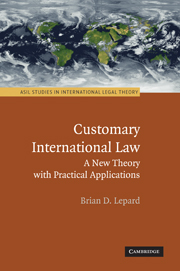Book contents
- Frontmatter
- Contents
- Figures
- Acknowledgments
- Cases
- PART ONE THE ENIGMAS OF CUSTOMARY INTERNATIONAL LAW
- PART TWO FOUNDATIONS OF A NEW THEORY OF CUSTOMARY INTERNATIONAL LAW
- PART THREE RESOLVING THE CONCEPTUAL ENIGMAS OF CUSTOMARY INTERNATIONAL LAW
- PART FOUR RESOLVING THE PRACTICAL ENIGMAS OF CUSTOMARY INTERNATIONAL LAW
- 12 General Sources of Evidence of Opinio Juris
- 13 The Role of Treaties as Evidence of Opinio Juris
- 14 The Role of United Nations General Assembly Resolutions as Evidence of Opinio Juris
- 15 The Role of Consistent State Practice
- 16 The Persistent Objector Exception
- 17 Defining Jus Cogens Customary Norms
- 18 Defining Erga Omnes Customary Norms
- 19 Resolving Conflicts with Treaties
- 20 Changing Customary International Law and the Role of International Organizations
- PART FIVE SOME APPLICATIONS OF THE THEORY
- PART SIX THE FUTURE OF CUSTOMARY INTERNATIONAL LAW
- Bibliography
- Index
18 - Defining Erga Omnes Customary Norms
Published online by Cambridge University Press: 05 June 2012
- Frontmatter
- Contents
- Figures
- Acknowledgments
- Cases
- PART ONE THE ENIGMAS OF CUSTOMARY INTERNATIONAL LAW
- PART TWO FOUNDATIONS OF A NEW THEORY OF CUSTOMARY INTERNATIONAL LAW
- PART THREE RESOLVING THE CONCEPTUAL ENIGMAS OF CUSTOMARY INTERNATIONAL LAW
- PART FOUR RESOLVING THE PRACTICAL ENIGMAS OF CUSTOMARY INTERNATIONAL LAW
- 12 General Sources of Evidence of Opinio Juris
- 13 The Role of Treaties as Evidence of Opinio Juris
- 14 The Role of United Nations General Assembly Resolutions as Evidence of Opinio Juris
- 15 The Role of Consistent State Practice
- 16 The Persistent Objector Exception
- 17 Defining Jus Cogens Customary Norms
- 18 Defining Erga Omnes Customary Norms
- 19 Resolving Conflicts with Treaties
- 20 Changing Customary International Law and the Role of International Organizations
- PART FIVE SOME APPLICATIONS OF THE THEORY
- PART SIX THE FUTURE OF CUSTOMARY INTERNATIONAL LAW
- Bibliography
- Index
Summary
A PROPOSED DEFINITION OF ERGA OMNES CUSTOMARY NORMS
In the 1970 Barcelona Traction Case the International Court of Justice (ICJ) first explicitly articulated the idea of erga omnes obligations – “obligations of a State towards the international community as a whole” – as distinguished from normal obligations of a state “arising vis-à-vis another State.” It asserted, “By their very nature” the former kinds of obligations “are the concern of all States. In view of the importance of the rights involved, all States can be held to have a legal interest in their protection; they are obligations erga omnes.”
The ICJ went on to give as examples of erga omnes obligations those derived from “the outlawing of acts of aggression, and of genocide, as also from the principles and rules concerning the basic rights of the human person, including protection from slavery and racial discrimination. Some of the corresponding rights of protection have entered into the body of general international law [citing the Reservations to the Genocide Convention Advisory Opinion]; others are conferred by international instruments of a universal or quasi-universal character.” The Court has more recently declared that the right of peoples to self-determination is an erga omnes right, that certain obligations of international humanitarian law have an erga omnes character, and that the rights and obligations enshrined in the Genocide Convention are erga omnes.
- Type
- Chapter
- Information
- Customary International LawA New Theory with Practical Applications, pp. 261 - 269Publisher: Cambridge University PressPrint publication year: 2010



